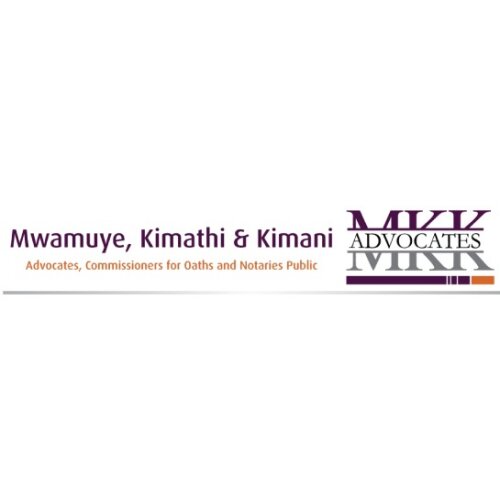Best Investment Lawyers in Kisumu
Share your needs with us, get contacted by law firms.
Free. Takes 2 min.
List of the best lawyers in Kisumu, Kenya
About Investment Law in Kisumu, Kenya
Kisumu, located on the shores of Lake Victoria, is a rapidly growing urban center in Kenya with significant opportunities for investment. It serves as a key economic hub in the western region of the country, attracting both local and international investors. The investment landscape in Kisumu is bolstered by various sectors including real estate, agriculture, trade, manufacturing, and technology. The city’s strategic position and evolving infrastructure make it an attractive destination for investors seeking growth potential in East Africa. However, navigating the investment landscape requires a good understanding of the applicable laws and regulations to ensure compliance and protect one’s interests.
Why You May Need a Lawyer
Engaging a lawyer with expertise in investment law can be crucial for several reasons:
- Understanding Legal Frameworks: Investment in Kisumu involves various legal frameworks that govern business operations, properties, and transactions. A lawyer can provide clarity on these laws.
- Contract Drafting and Review: Professionals can help in drafting and reviewing contracts to safeguard your interests and ensure all legal requirements are met.
- Dispute Resolution: In case disputes arise, legal experts can provide counsel on litigation, arbitration, or negotiation to resolve conflicts efficiently.
- Regulatory Compliance: Lawyers ensure that your investment activities comply with local and national regulations, minimizing the risk of legal penalties.
- Risk Management: Legal professionals help identify and mitigate potential legal risks associated with investment projects.
Local Laws Overview
The investment sector in Kisumu is guided by various laws and regulations designed to foster a conducive environment for economic activities:
- The Companies Act: Governs the establishment, registration, and operation of companies in Kenya. It outlines the legal requirements for both foreign and local investors.
- Land Laws: These include the Land Act and the Land Registration Act, which are crucial for investors dealing with real estate or agriculture sectors. They define land rights, registration processes, and transfer protocols.
- Investment Promotion Act: This Act offers incentives and protections for investors, encouraging both local and foreign investments.
- Environmental Management and Coordination Act (EMCA): Sets out the regulations for environmental conservation, impacting sectors like agriculture and manufacturing.
- Tax Regulation: Investors need to understand the tax incentives, liabilities, and obligations as outlined in Kenyan tax laws.
Frequently Asked Questions
What are the key sectors for investment in Kisumu?
Major investment sectors include real estate, agriculture, trade, transport, and manufacturing. Technology and services are also emerging as promising areas.
How can a foreigner start a business in Kisumu?
Foreign investors need to comply with the Companies Act, secure necessary licenses, register with relevant government bodies, and adhere to the foreign investment policies in place.
Are there incentives for investors in Kisumu?
Yes, the government offers various incentives such as tax reliefs, subsidies, and guarantees to attract and support investors in certain sectors.
What legal structures are available for businesses?
Common legal structures include sole proprietorships, partnerships, limited liability companies, and public companies. Each has unique legal and tax implications.
What is required to purchase land in Kisumu?
Land purchases require due diligence, verification of the title deeds, compliance with the Land Act, and often involve lawyer services to ensure proper legal transaction.
How are disputes in investments resolved?
The preferred methods include negotiation, mediation, arbitration, and litigation, with alternative dispute resolution (ADR) being encouraged for its efficiency and cost-effectiveness.
Is it necessary to hire a local lawyer?
While not mandatory, hiring a local lawyer is advisable as they offer valuable insights into local laws and practices, enhancing the legal standing and success of your investments.
What permits and licenses are needed to operate a business in Kisumu?
The requirements vary depending on the business type and industry, but generally include a business license, sector-specific permits, and registration with the Kenya Revenue Authority (KRA).
How do taxes affect investments in Kisumu?
Investors are subject to corporate taxes, VAT, and sector-specific levies. Understanding tax regulations can unveil incentives and avoid legal liabilities.
What are the risks of not understanding local laws?
Non-compliance with local laws can result in fines, business closure, loss of investment, and legal disputes, making it critical to understand the legal landscape.
Additional Resources
For individuals seeking more information or assistance, the following resources could be beneficial:
- Kenya Investment Authority (KenInvest): Provides support and guidance for investors in Kenya.
- Law Society of Kenya: Offers directories of qualified lawyers specializing in investment law.
- Kisumu County Government: Local government provides resources and information on regional opportunities and regulations.
- Kisumu Chamber of Commerce: Assists with business-related matters and investment insights in the Kisumu region.
Next Steps
If you require legal assistance with investment in Kisumu, consider taking the following steps:
- Identify your specific legal needs related to your investment interests.
- Consult with a knowledgeable lawyer specializing in investment and business law.
- Ensure all your transactions and business operations comply with local and national laws.
- Keep abreast of any legal changes or updates in investment law that may affect your operations.
- Utilize the resources and governmental bodies mentioned above for additional guidance and information.
Lawzana helps you find the best lawyers and law firms in Kisumu through a curated and pre-screened list of qualified legal professionals. Our platform offers rankings and detailed profiles of attorneys and law firms, allowing you to compare based on practice areas, including Investment, experience, and client feedback.
Each profile includes a description of the firm's areas of practice, client reviews, team members and partners, year of establishment, spoken languages, office locations, contact information, social media presence, and any published articles or resources. Most firms on our platform speak English and are experienced in both local and international legal matters.
Get a quote from top-rated law firms in Kisumu, Kenya — quickly, securely, and without unnecessary hassle.
Disclaimer:
The information provided on this page is for general informational purposes only and does not constitute legal advice. While we strive to ensure the accuracy and relevance of the content, legal information may change over time, and interpretations of the law can vary. You should always consult with a qualified legal professional for advice specific to your situation.
We disclaim all liability for actions taken or not taken based on the content of this page. If you believe any information is incorrect or outdated, please contact us, and we will review and update it where appropriate.











